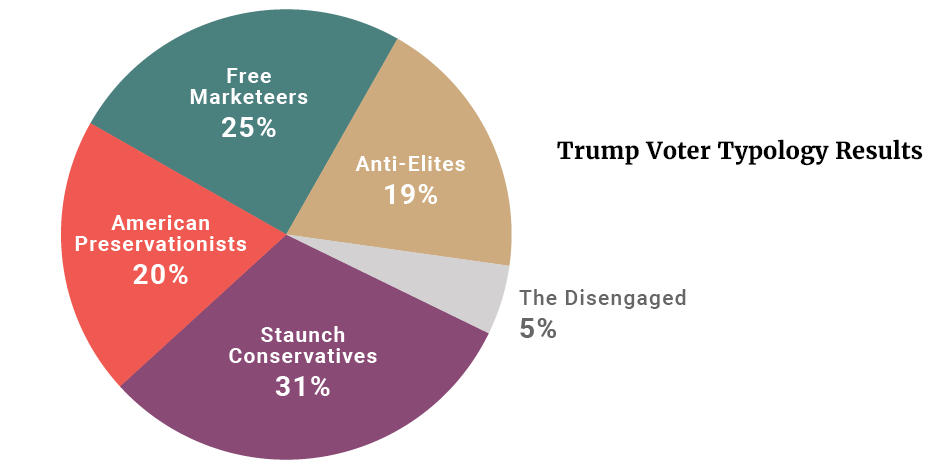Why Trump supporters never waver
Different president. But it’s still the economy, stupid.
Critics of President Trump seemed dumbfounded by his steady approval rating, which, while low, also seems impervious to scandal, lying, poor policymaking and outrageous behavior.
Trump’s approval rating stands at 42%, according to Gallup, which tracks Americans’ views of the president weekly. Trump’s high for the year was 45% in mid-June, and the low was 36% in late January. So he has generally drifted upward this year. Here’s the trend:

This shouldn’t be happening, some analysts believe. Trump has enraged critics during the last few months by pandering to Russian dictator Vladimir Putin, hurting American farmers with protectionist trade policies, breaking up migrant families at the southern border, and lying on a daily basis. His personal scandals seem to be deepening, as former fixer Michael Cohen turns on him and the Mueller investigation widens.

So why do Trump’s supporters stick with him? Three basic reasons: They don’t pay close attention to policy issues the way Washington eggheads and media elites do. Trump continues to deliver on key issues they care about, such as immigration. And perhaps most important: the economy is strong.
“Trump has offended immense numbers of people,” says Emily Ekins, director of polling at the libertarian Cato Institute, who has published a detailed analysis of Trump voters. “But most people aren’t paying as close attention as the people in New York and D.C. whose job is to follow these issues. And the economy is hugely important to understanding voter choice.”
There’s good and bad news for Trump in the stability of his support. He does seem to have a core set of voters who will back him even if he shoots somebody on Fifth Avenue. That may provide a floor of 30% or so to his approval rating, meaning he wouldn’t slip below that under any circumstance.
But the additional support—in the range of 12% to 15%—isn’t as solid, and could waver if the economy weakens. It’s also notable that Trump’s approval rating isn’t higher, given strong growth and a very low unemployment rate of 4%. The last time unemployment was that low was in 2000, when Bill Clinton’s approval rating hovered around 60% – and that was after the House of Representatives impeached Clinton for lying about an affair with White House intern Monica Lewinsky.
In a study for the Democracy Fund Voter Study Group, a privately funded research outfit, Ekins identified five types of Trump voters and assessed how important each group was to Trump’s victory. The breakdown helps explain why Trump’s supporters stick with him, no matter how controversial he is. It also reveals Trump’s weaknesses, which are considerable. Here’s an overview:

Staunch conservatives and American preservationists are Trump’s true base, representing about half of those who voted for him. They tend to be America-first nativists who are socially conservative and opposed to immigration, and may feel culturally threatened. Trump’s hard-line immigration policy is meant for them, and they’ll probably stick with him no matter what.
The disengaged, a small portion of Trump voters, aren’t very knowledgeable about politics, but they do tend to feel powerless and left behind in the modern economy. Trump’s vilification of immigrants and Muslims may appeal to them and earn their loyalty.
Free marketeers and anti-elites are more moderate. They tend to be traditional Republicans who may have voted for Trump simply out of party loyalty. They support free trade and a light government touch on the economy, which is at odds with Trump’s interventionist trade policy. Some of these people already regret voting for Trump, and he could lose more if his protectionist trade policy backfires or the economy weakens. Since these two groups represent about 45% of Trump voters, his approval rating could fall into the mid or low 30s if the economy begins to struggle, which would weaken Trump’s political power and his leverage over fellow Republicans in Congress. This is his biggest vulnerability.
Bill Clinton’s campaign team realized it’s the economy, stupid, back in 1992, which helped the young governor beat George H. W. Bush in that year’s presidential campaign. Some analysts think that logic doesn’t apply to Trump, as if every Trump supporter today would still be with him if companies were slashing jobs and the stock market were in a free fall. But Trump is just as tied to the economy as any other president, and his relatively weak approval in boom times may make Trump even more vulnerable to a downturn.
“He has underperformed, given the economic fundamentals,” Ekins says. “It shows what being offensive can do to a candidate.” It may show even more if those fundamentals weaken.
Confidential tip line: [email protected]. Click here to get Rick’s stories by email.
Read more:
Rick Newman is the author of four books, including “Rebounders: How Winners Pivot from Setback to Success.” Follow him on Twitter: @rickjnewman
Follow Yahoo Finance on Facebook, Twitter, Instagram, and LinkedIn
